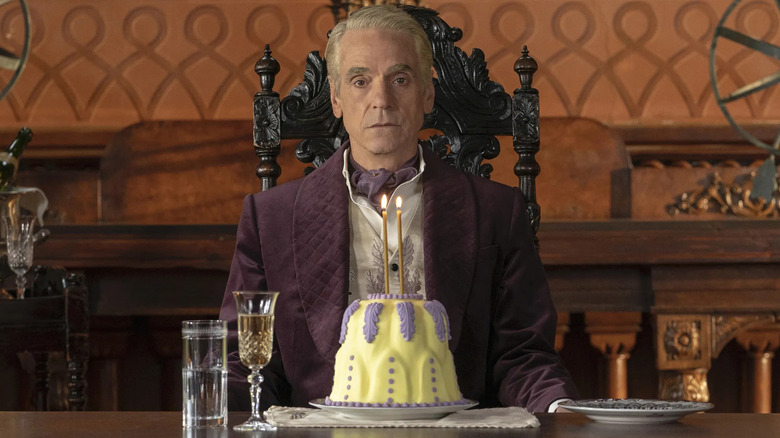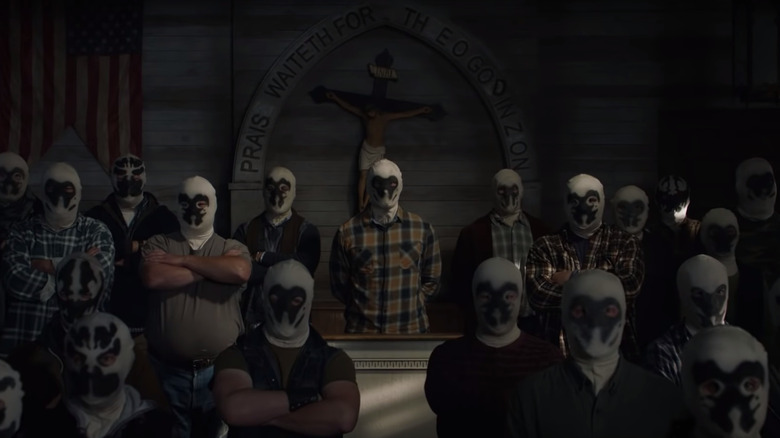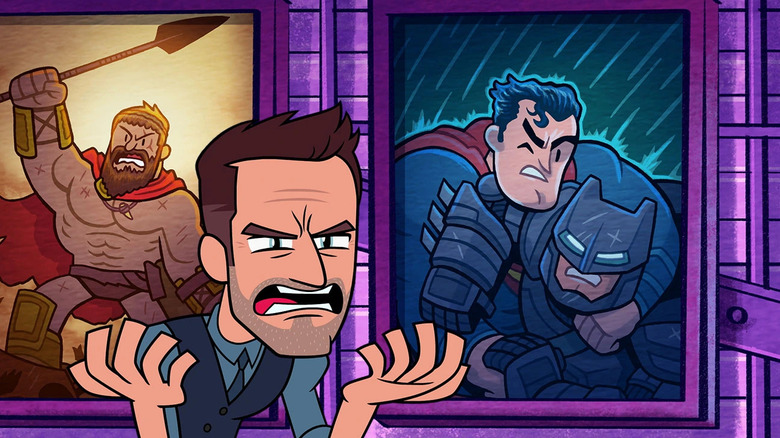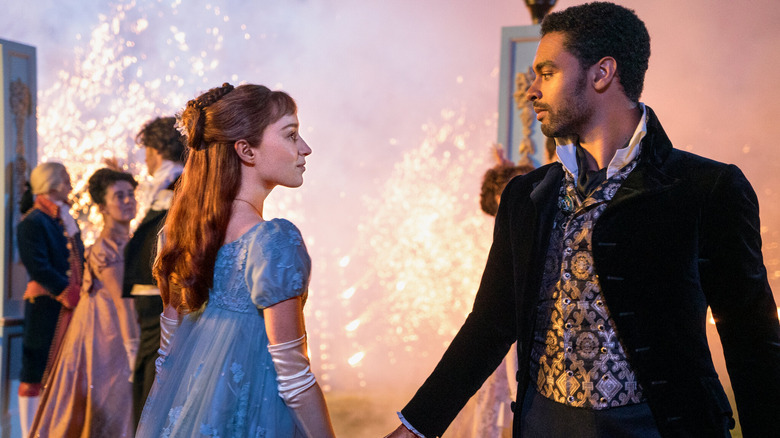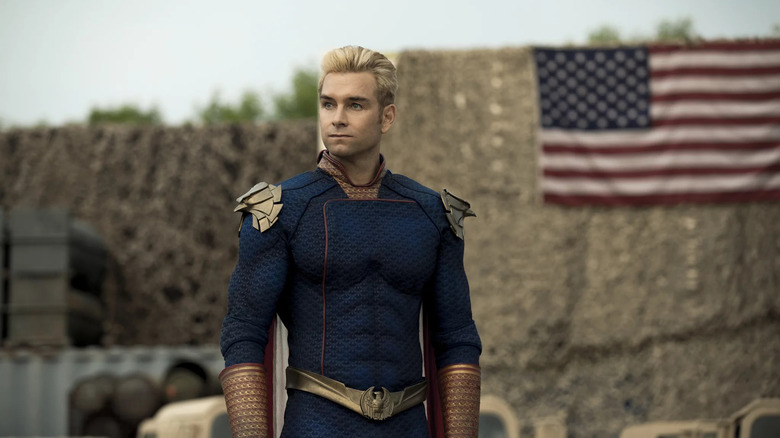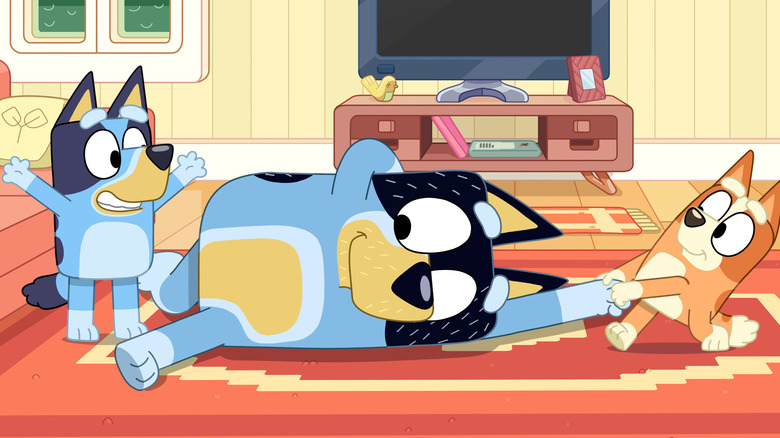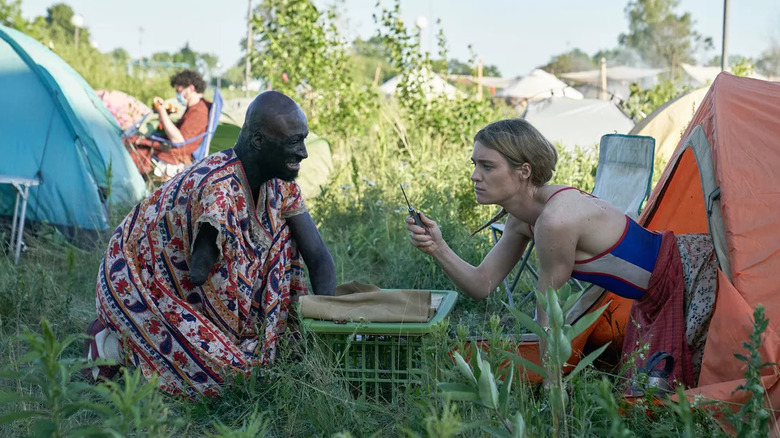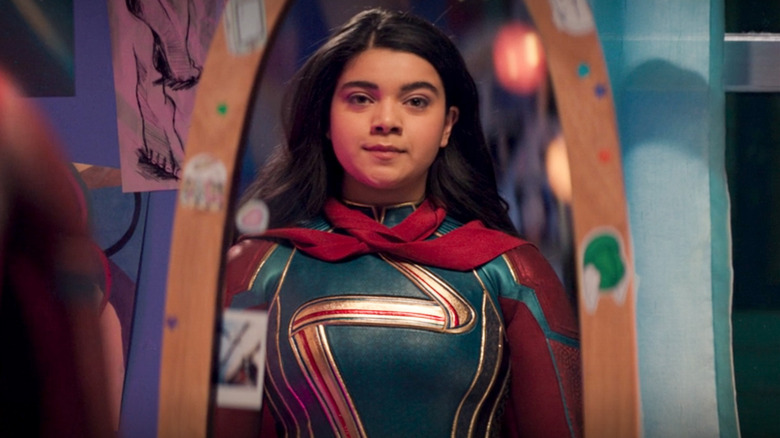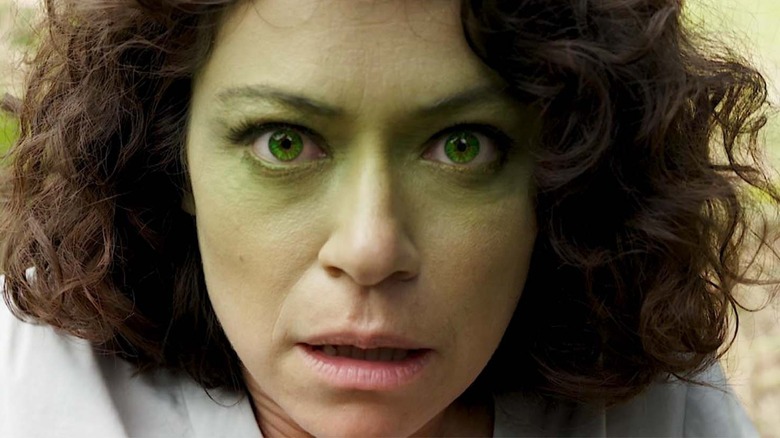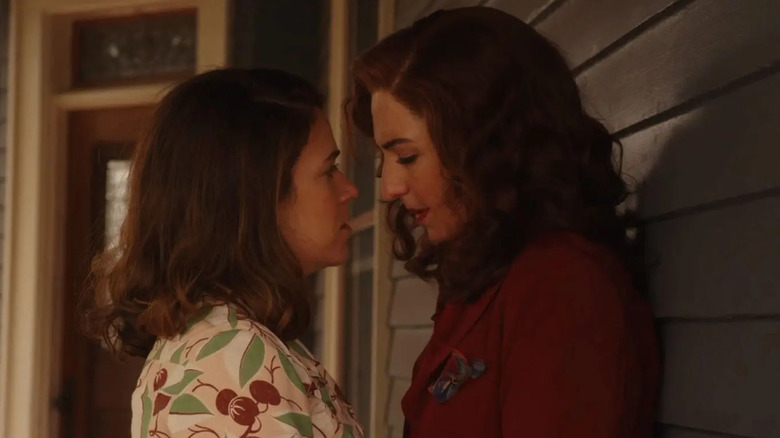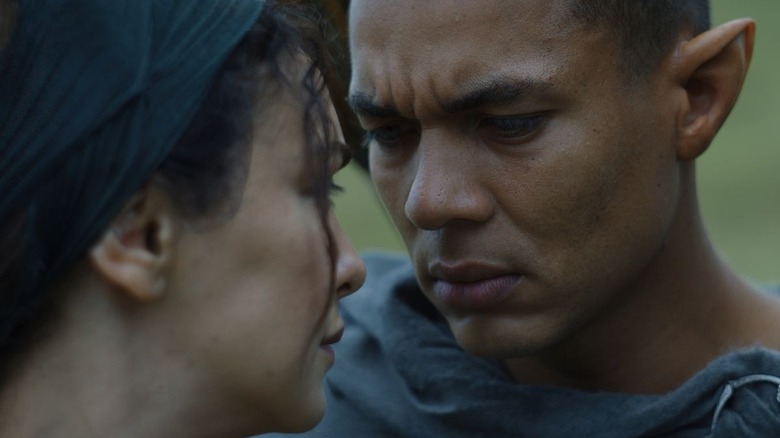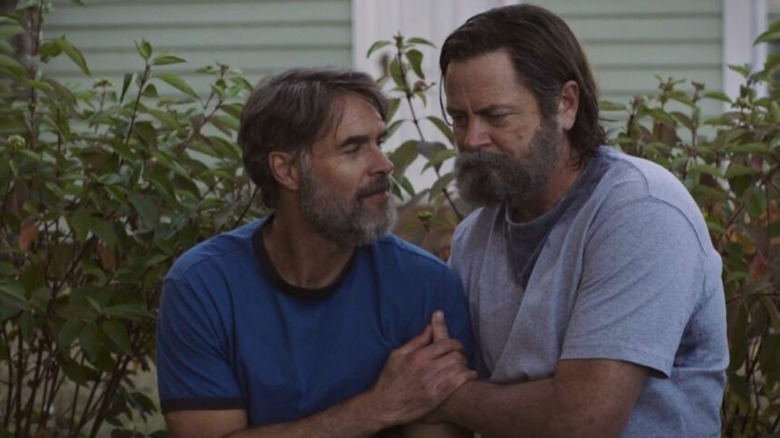Great TV Shows That Wound Up Getting Review Bombed
We may receive a commission on purchases made from links.
Everyone has an opinion. And thanks (or no thanks) to the internet, everyone is free to express them on forums like Twitter and Reddit, in comments sections, and in the form of reviews. As for the latter, most of the time this type of crowdsourcing helps prospective buyers determine whether or not to purchase a certain brand of product or stay at a certain chain of hotels. When it comes to books, music, movies, TV shows, and video games, user reviews can convince potential audiences to join in or pass on a particular pop culture phenomenon. But what happens when unfavorable reviews are left in bad faith?
Review bombing originated in the early 2000s in the video game space when disappointed players began organizing their efforts to complain about the game "Spore," which set a precedent. Like-minded anonymous consumers of content could band together and wield power, regardless of whether their gripes were valid. Within the next decade, review bombing would become more commonplace. Some of the most notorious examples include 2016's "Ghostbusters," 2017's "Star Wars: The Last Jedi," 2019's "Captain Marvel," and 2020's "The Last of Us Part II," the much-anticipated sequel to the hit Playstation game.
Titles that tackle hot-button issues like race, gender, sexuality, and religion are most likely to get caught in the blast zone of review bombings. But as these 12 shows prove, all of which received critical acclaim and gained fan followings, it can happen to any story for any reason.
Watchmen
HBO's 2019 miniseries "Watchmen" was one of the most critically acclaimed shows of that year. This remix of the popular 1986 DC comic is as thought-provoking as the material that inspired it and put together with top-tier talent and high production values. Created by Damon Lindelof of "Lost" fame and starring Regina King, Tim Blake Nelson, Jeremy Irons, Jean Smart, Hong Chau, and Yahya Abdul-Mateen II, "Watchmen" updated many of the characters and storylines from the original mostly by setting them further into an alternate future. But it wasn't that sort of creative liberty that angered some fans; it was the way the show addressed systemic racism and white supremacy head-on.
Episode 1 begins with a dramatization of the 1921 Tulsa Race Massacre, a real but under-taught event from American history in which a white mob laid waste to the thriving and largely Black neighborhood of Greenwood, killing hundreds. "Watchmen" also weaves the stories of real Black figures like Bass Reeves into its narrative. What really got under the skin of review bombers, however, was the fact that a white power militia group, having co-opted Rorschach's mask as their own symbol, was depicted as the show's main antagonizing force.
As Esquire points out, the plethora of one-star reviews users posted was not only lacking in legitimate criticism, but they demonstrated a misunderstanding of the political leanings of the "Watchmen" comics. Naysayers may have taken to calling it "Wokemen," but critics and fans called it timely and ambitious.
Teen Titans GO!
Most of the time, review bombing happens when a series wades into a polarizing socio-political issue. But sometimes, the phenomenon occurs because of the involvement of a single polarizing personality. "Teen Titans GO!" is an animated series that premiered on Comedy Central in 2013, and critics and audiences alike enjoy its manic visual style and its irreverent pop cultural commentary. Its popularity even spawned a 2018 feature film, "Teen Titans GO! to the Movies." For the most part, these adolescent versions of Robin, Cyborg, Beast Boy, Starfire, and Raven stayed out of the drama that has consumed the DCEU in recent years. Then, Zack Snyder guest-starred in an episode.
In the 365th episode of the series (titled "365!") and the Season 7 finale, in a meta plot reminiscent of the movie, the group venture to Warner Bros. Studios on the hunt for a director who can make their milestone episode extra special. "365!" is full of Easter eggs that gently poke fun at Snyder's career as well as the greater DCEU, but there's nothing particularly pointed about any of it.
That didn't stop people from arguing about whether "365!" was the best or the worst thing they'd ever seen. The director's loyal fanbase took to the internet to support the episode, while those who aren't exactly Snyder diehards tried to balance out overly positive ratings with negative ones. In the aftermath, a debate raged as to which element constituted the more toxic fandom.
Bridgerton
As 2020 gave way to 2021, Netflix subscribers gave in to a steamy period romance in numbers they never had before. "Bridgerton" broke viewership records just as its swoon-worthy leading man, Regé-Jean Page, broke hearts (especially when he declined to return for Season 2). On the whole, most critics and audiences loved the Regency-era drama for what it was: soapy escapism wrapped up in a colorful, fantastical aesthetic. But for some, "Bridgerton" was a bit too colorful and fantastical.
While Simon Basset, Duke of Hastings became an instant heartthrob for a majority of fans, some viewers took issue with his race and with how race was depicted in the series. A portion of these critiques was made in the guise of historical accuracy. "Bridgerton" features several actors of color playing members of high society in the early 1800s, including Golda Rosheuval as Queen Charlotte. There are historical records of Black aristocrats as well as unproven rumors about Queen Charlotte's ancestry, but the show basically treats race as an afterthought.
Most critics and fans accepted this as a win for representation (actors of color are severely limited when it comes to roles in historical dramas), though two vocal minorities had objections. Some held that "Bridgerton" wasn't progressive enough and, per USA Today, accused it of colorism. Others complained about the presence of Black actors at all and accused Netflix of pandering to "modern" and "woke" audiences with its color-conscious casting and its central interracial couple.
The Boys
"The Boys" is a satirical twist on the ubiquitous superhero genre. The show uses dark comedy and its TV-MA levels of violence to subvert the very idea of heroes and villains and explore some pretty heavy themes. It's been well-reviewed since its launch back in 2019 and, per Deadline, has been one of Amazon Studios' most successful efforts to date. Given its edgy style and subject matter, some percentage of displeasure is to be expected. Sure enough, as the show went on, a few once-devoted fans began to air their grievances primarily about male nudity and a perceived leftist bias. But "The Boys" got review bombed in earnest when producers dared to switch up the release strategy.
The first season of "The Boys" came in one fell swoop in 2019. Then, Season 2 allowed viewers to access the first three episodes on its September 11th premiere date, but Episodes 4-8 dropped on a weekly basis thereafter, which upset some fans more than it probably should have. Disgruntled Prime members even took to their keyboards to express their outrage.
The series, which boasted a vast majority of five-star reviews prior to the change, was suddenly hampered by an onslaught of one-star ratings numbering in the thousands. As Comicbook noted, many of these conflated the quality of "The Boys" with the new release schedule. Curiously, people seemed to instantly sour on the show that they were also desperate to binge all at once.
Bluey
Even something as wholesome and inoffensive as "Bluey" can become the victim of review bombing. This adorable Australian cartoon about a family of heeler dogs has taken the world by storm, and its adoring audience extends far beyond its target preschool demographic. Parents enjoy "Bluey" as much as if not more than their children thanks to its relatable family dynamic and its short, gamified episodes. But one 2020 episode titled "Sleepytime" received so much praise, it sparked a childish backlash.
"Sleepytime" is a surprisingly artful and emotional seven-minute story about Chilli and Bandit's valiant attempts to get their kids, Bluey and Bingo, to sleep in their own beds through the night. According to Australia's 7 News, when the show's executive producer proudly tweeted that "Sleepytime" was the second highest-rated episode of TV ever, coming in right behind "Breaking Bad" Season 5 episode, "Ozymandius," fans of another animated series made it their business to tarnish Bluey and family's perfect rating.
"Attack on Titan" watchers review bombed "Bluey," which had taken over its coveted number two spot. To be precise (per Vice), 116 petty users left negative reviews of the kid's show on IMDb, knocking it down to 17th place, prompting one Twitter user to comment, "This is why we can't have nice things."
Station Eleven
Prestige dystopia is having a moment and one of the best examples is 2021's "Station Eleven." The HBO miniseries is based on the novel of the same name by Emily St. John Mandel, and it's the rare case in which the TV adaptation actually improves upon the already excellent source material. "Station Eleven" brings together an ensemble cast to tell a seemingly disjointed story about what remains of civilization after a deadly viral outbreak. While it's ostensibly about surviving an apocalypse, it's really about the value of things like community, faith, science, and art. The series was nominated for a multitude of awards, including seven Emmys, and stands at an impressive 98% approval rating on Rotten Tomatoes.
Its audience score is more than 20 points lower, however, as are its IMDb user ratings. The majority of reviewers were moved by the miniseries, which, in part, follows a group of Shakespearian actors and makeshift museum keepers as they try to live with purpose amidst the chaos. "Station Eleven" is, like the book that inspired it, pretty literary, and other reviewers found the show to be too pretentious, which is a valid argument. That the series is unwatchable because it features a queer female character in the lead role is a less defensible point of view. An oddly high number of low rating note "Station Eleven" for being about "hippies," which suggests the series develops a specific reputation among certain audiences.
Ms. Marvel
Films and TV shows about comic book characters are particularly vulnerable to review bombing. Usually, pre-existing fanbases and their headcanon-like expectations are to blame, but that's not what troubled 2022's "Ms. Marvel," which is one of the most statistically provable cases of review bombing in pop culture history. Critics ranked the six-episode Disney+ series about Kamala Khan, a 16-year-old Pakistani American Muslim girl, at the very top of the entire MCU. Its 98% fresh rating beats that of "Black Panther" and "Avengers: Endgame." Even Kamala's biggest fans will admit that the series isn't perfect as "Ms. Marvel" gets off to an exhilarating start but falters a little toward the end. Nevertheless, critics and fans championed newcomer Iman Vellani in the lead role and touted the show's refreshing take on teenage superhero-dom.
The Rotten Tomatoes audience score and IMDb's rating are different stories; there, "Ms. Marvel" comes in at the bottom of the pack. Forbes' Paul Tassi dug into the numbers and found that the show had racked up 22.2% one-star reviews; far more than every other MCU series. Most of the one-star reviews were left by male users over the age of 30. In his piece, Tassi makes an educated guess that angry dissenters objected to a young, female, Muslim, non-white protagonist and implies that some incorrectly believed the character of Kamala was replacing Carol Danvers as Captain Marvel (though actress Brie Larson and her Captain Marvel have also been subject to online harassment).
She-Hulk: Attorney at Law
"Ms. Marvel" may have been the queen of one-star reviews at the time of its debut, but another Marvel series for Disney+ stole its crown just weeks later, and in dramatic fashion. "She-Hulk: Attorney at Law" was bombarded with a whopping 35.8% one-star ratings, and many were registered before it even premiered. Returning to investigate the matter for Forbes, Paul Tassi compared the "She-Hulk" IMDb stats to that of "The Falcon and the Winter Soldier." Both shows received comparatively positive marks from critics, but "The Falcon and the Winter Soldier" has only 3% one-star reviews. Tassi acknowledges that some fans had concerns about the quality of the CGI, but that alone doesn't explain the disparity between the show's defenders (mostly women) and its detractors (again, mostly men over the age of 30).
The real answer is almost certainly the tone with which "She-Hulk" was made and one that hews closely to the comic upon which it's based. Starring Tatiana Maslany as Jennifer Walters, "She-Hulk: Attorney at Law" plays like an "Ally McBeal"-style romantic workplace comedy with a healthy dose of meta Marvel commentary to boot. It was created by a woman (Jessica Gao), directed by a woman (Kat Coiro), and pitched primarily at women. Charlie Cox, who appeared on the show as Matt Murdock-slash-Daredevil, Jennifer's love interest-slash-adversary, instructed review bombers to simply watch something else if "She-Hulk" wasn't for them.
A League of Their Own
In 1992, "A League of Their Own," starring Tom Hanks and Geena Davis, told the compelling story of the women who filled the rosters of professional baseball teams while young men fought overseas in World War II. The much-loved film was a fictionalization of true events, but it left out an aspect of the real story that co-creator and star Abbi Jacobson sought to correct with her television series for Amazon Prime Video. Jacobson told ET that research into the All-American Girls Professional Baseball League revealed that a number of the players were queer and were pressured to stay in the closet and that lesbian relationships were left out of the film out of fear they'd be too controversial.
As it turns out, the real story behind AAGPBL was still too much for some audiences in 2022. The series received roundly glowing reviews from critics, who called it a "shining example" of adaptation and touted its lived-in performances and detail-oriented production design. Its audience score is a tale of two demographics. LGTBQ+ viewers were elated. But fans of the original who were unaware of the previously omitted and historically accurate queer element called it, among other things, a "lesbian orgy." IMDb users expressed similar sentiments.
The Lord of the Rings: The Rings of Power
In 2022, dueling fantasy series hit dueling streaming services — HBO had its "Game of Thrones" prequel, "House of the Dragon," and Amazon had its "Lord of the Rings" spinoff, "The Lord of the Rings: The Rings of Power." A huge number of subscribers tuned in, resulting in second-season renewals for both shows. But while fans of "House of the Dragon" took to the internet with memes and lighthearted debates over who was the most despicable character (the correct answer is Ser Criston Cole), purported fans of J.R.R. Tolkien took to Amazon.com with nasty things to say about this rendition of Middle-earth, and about a pair of elves in particular.
Unhappy viewers began review bombing "The Rings of Power" on Rotten Tomatoes, IMDB, and Amazon; it got so bad, the online retail giant and studio had to suspend user reviews. While a portion of the responders disliked the portrayal of a younger Galadriel, most of the criticism was aimed at a new character — an elf named Arondir — played by Ismael Cruz Córdova, who is Puerto Rican. Some commenters tried to rationalize their displeasure by claiming they didn't have a problem with racial diversity on TV in theory; they just didn't want this story to be diversified. Some user reviews were more overtly bigoted. The cast of the original film trilogy came to the show's defense, sporting hats and shirts that read, "You are all welcome here," in elvish.
The Last of Us
"The Last of Us" Episode 3 is another target of online trolls. "Long, Long Time" is an instant classic, with some going so far as to call it the best episode of television ever. This 70-plus minute diversion from the fungus zombie A-plot is arguably the most authentically human glimpse into post-apocalyptic life yet and it just so happens to center around a middle-aged gay couple.
The episode documents survivalist Bill's (Nick Offerman) 20 years following the outbreak, 16 of which were spent with his companion, Frank (Murray Bartlett), whom he met as an escapee on his way to Boston. The episode — which is as life-affirming as it is devastating — shows us Bill and Frank's relationship in a collage of stolen moments, from the bitterness of stupid fights to the sweetness of homegrown strawberries.
Predictably, some viewers weren't thrilled to see physical and emotional intimacy between two men. Episode 3 has more than 28% one-star reviews on IMDb (Episode 1 has zero), but not all of them mention Bill and Frank's sexuality (which is rooted in the video game). That doesn't mean homophobia isn't behind the review bombing. Wannabe disrupters often know better than to wear their prejudices on their sleeves and will instead coalesce around a more acceptable narrative. Their argument against Episode 3? It is a wasted chapter that doesn't propel the series forward. But that's a difficult case to make when "Long, Long Time" had most of the audience in tears.
